Blog
Cloud Phone System
AI Phone System Explained: A Complete Guide for Businesses

AI Phone System Explained: A Complete Guide for Businesses
Learn what an AI phone system is, how it works, and explore its key features, common use cases, and real-world applications across industries.
Business phone systems have evolved far beyond the days of physical landlines and server rooms. What once required complex hardware and costly maintenance can now be launched in hours through a cloud-based setup, with no infrastructure or heavy upfront investments.
Now, we’re entering the next era of business communication: the AI phone system.
If you’re a business owner wondering how this trending “AI” can make a real difference in your daily communications, here’s the surprise: modern AI phone systems do far more than just transcribe calls or take notes. They can fully automate routine calls while delivering faster, more personalized service without adding extra overhead.
In this article, we’ll break down what an AI phone system is, explore its key features, common use cases, and real-world applications across industries.
What Is an AI Phone System?
An AI phone system is a cloud-based business phone solution that uses artificial intelligence to automate and enhance how companies manage their calls, both incoming and outgoing. Built on the foundation of virtual phone systems, it goes a step further by using AI technologies to handle tasks that traditionally required human involvement, such as routing calls, answering questions, summarizing conversations, and even performing follow-ups.
AI Phone Systems vs. Cloud Phone Systems
A cloud phone system is a modern communication solution that operates entirely online, using VoIP (Voice over Internet Protocol) technology to transmit calls over the internet. Some cloud phone systems incorporate limited AI capabilities such as automatic call transcriptions or summaries to streamline basic tasks. However, their use of AI is minimal and largely supportive, which means they cannot be fully classified as AI phone systems.
An AI phone system, on the other hand, builds on the foundation of a cloud phone system but takes it several steps further. It doesn’t just use AI to automate small tasks. it embeds intelligence into the entire communication flow. From AI phone answering and routing systems to automated follow-ups, AI phone systems bring a higher level of automation to every customer interaction.
Key Features of AI Phone Systems
AI phone systems combine the flexibility of cloud technology with the intelligence of automation. They go beyond traditional cloud-based solutions by embedding artificial intelligence into every step of the communication process. Below are the key features that make AI phone systems stand out:
AI Answering System
This is the defining feature that truly makes a phone system “AI-powered.” An AI answering system uses AI voice agents, which function like an answering service with human operators capable of handling incoming calls around the clock. It works seamlessly after business hours, on weekends, and during holidays, without the added cost of night or overtime shifts.
These agents can greet callers, understand natural speech, hold human-like conversations, answer questions, and provide relevant information instantly.
Voice AI systems with direct phone number access make it possible for businesses to assign real phone numbers directly to their AI voice agent. When the AI answering system is part of an AI phone system, customers can simply dial the number and be instantly connected, without the need for apps, logins, or special interfaces.
Discover everything you need to know about AI voice agents.
Natural Call Routing
Traditional IVR systems often frustrate customers with long menus and rigid “press 1, press 2” navigation. AI phone systems eliminate that friction by leveraging speech recognition and natural language processing (NLP), they understand caller intent and route calls intelligently based on what the person actually says.
For instance, if a caller says, “I need help with my invoice,” the AI can instantly recognize the intent, match it with pre-defined keywords, and transfer the call to the billing department. This creates a faster, more intuitive experience and helps businesses reduce call handling time.
Smooth AI-Human Handoff
Even the most advanced AI can’t replace human expertise in every scenario — and it shouldn’t. When a caller’s question requires human assistance, the AI can seamlessly transfer the conversation to a human agent while passing along the context it has gathered (e.g., “Caller wants to discuss a complex billing issue”). This eliminates the need for the customer to repeat themselves and helps human agents pick up right where the AI left off.
This smooth handoff transforms the AI from a replacement tool into a collaborative assistant, augmenting human work rather than competing with it.
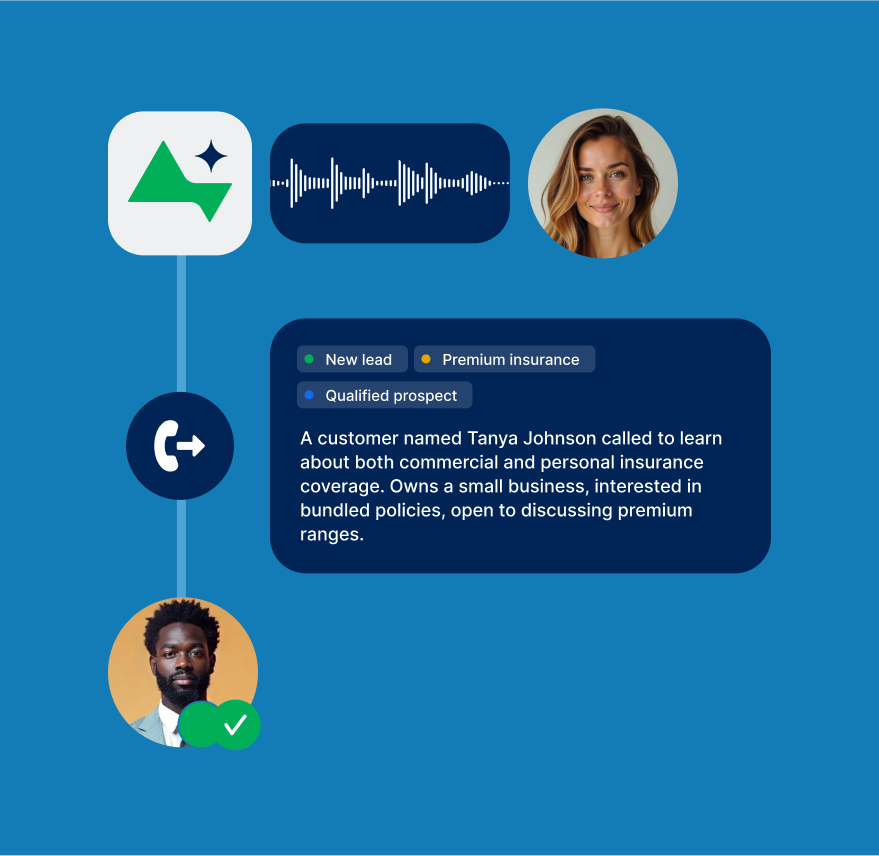
Knowledge Base and Continuous Training
AI voice agents can be connected to a business-specific knowledge bases that contains FAQs, company policies, product details, and service information. This allows the AI to provide accurate, on-brand answers to customer questions such as store hours, pricing, or return policies.
Over time, the system can be continuously trained by adding new information and refining responses based on real interactions. This ensures the AI becomes smarter and more accurate the longer it’s in use.
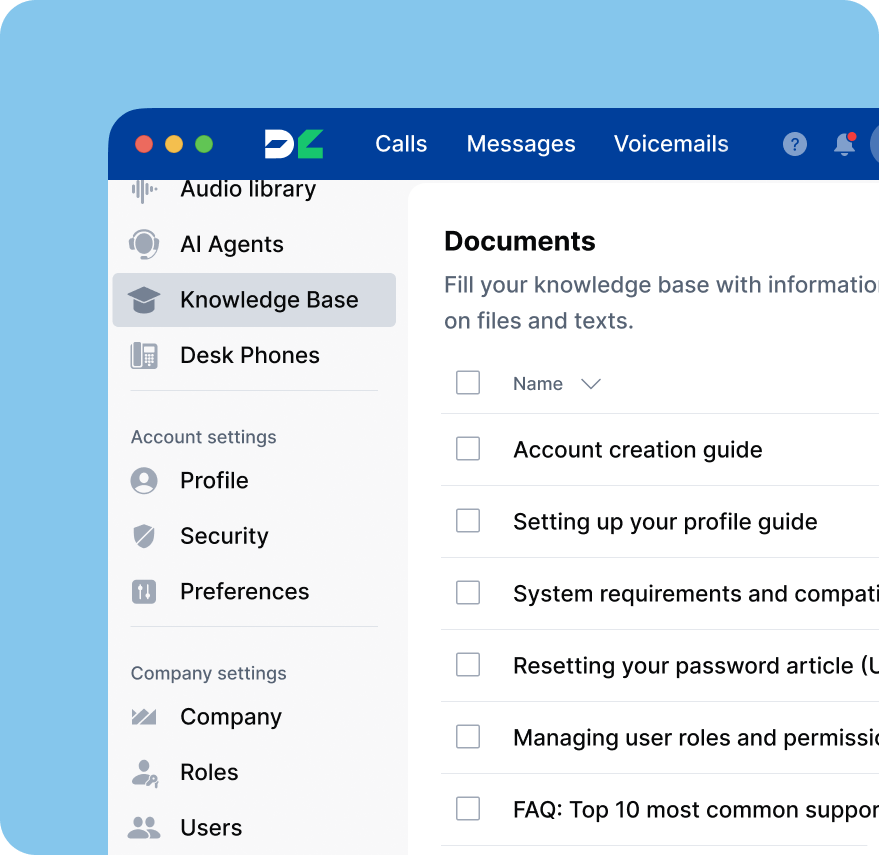
Integration with Business Systems
AI voice agents can integrate with your existing business tools such as CRMs, scheduling platforms, and helpdesk systems through MCP (Model Context Protocol) servers. This integration allows them to access and update real-time business data, enabling more personalized interactions and the ability to perform meaningful actions during a call.
For example:
- In a service business, the AI can access your booking calendar to schedule or modify appointments.
- In eCommerce, it can check order status or product availability directly from your online store.
- In sales, it can update lead records, log notes, or create follow-up tasks automatically.
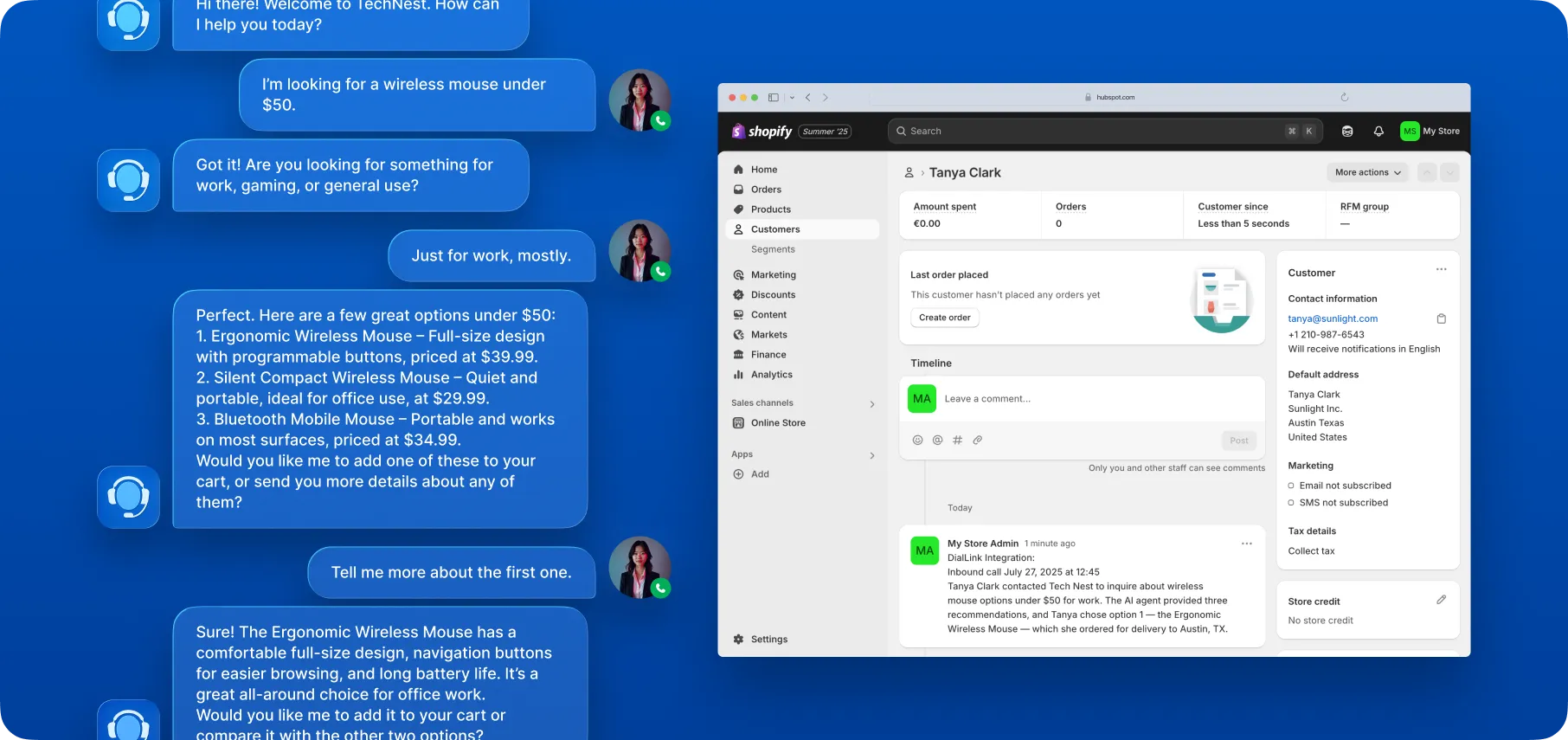
Related reading: Learn more about MCP servers and how they enhance AI voice agents’ capabilities.
Call Transcription and Records
Every AI-handled call can be automatically transcribed and recorded, creating complete records for compliance or review. Businesses can revisit transcripts to verify details, track conversations, or identify recurring customer needs, all without manually listening to recordings.
AI Call Summaries and Action Items
Beyond simple transcriptions, AI phone systems can generate call summaries and action items that highlight key discussion points, next steps, or commitments made during the call. This is like having an automatic note-taker that saves time and ensures accuracy across your team. Summaries can also sync directly with your CRM or task management system, keeping your operations organized and efficient.
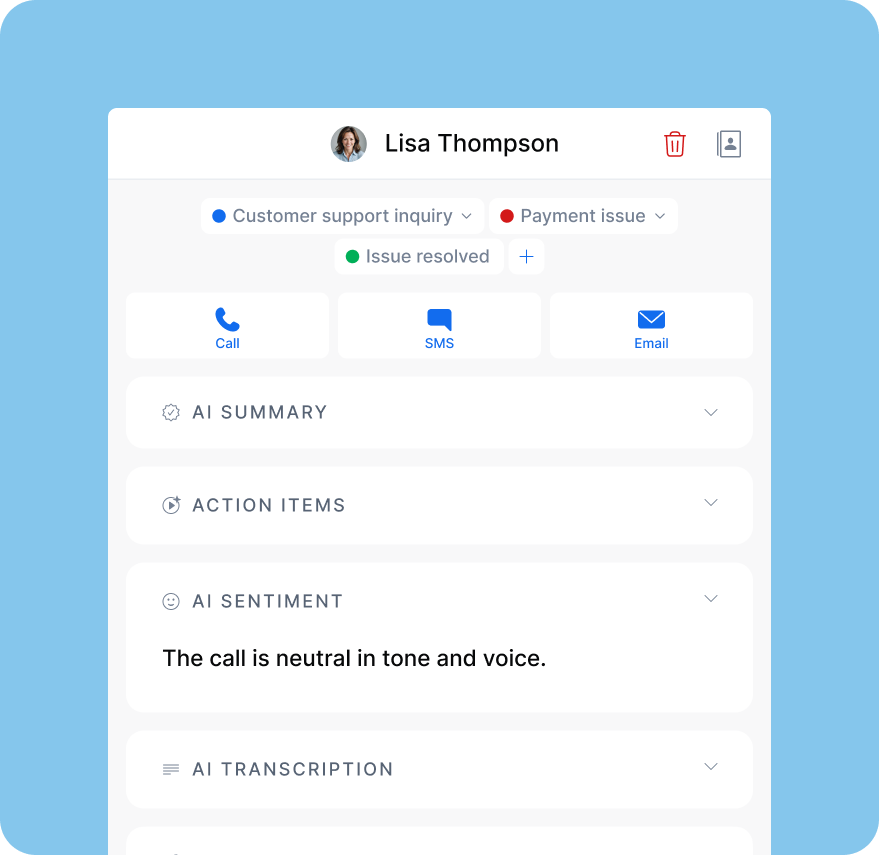
Analytics and Insights
AI phone systems go beyond handling calls, as they help businesses make sense of their communication data. The built-in analytics tools can track key metrics, identify patterns, and extract actionable insights to monitor team and system performance. Some systems even use sentiment analysis to detect caller emotions, such as frustration or satisfaction, providing a deeper understanding of customer experience.
These insights can be used for quality assurance, training, and continuous improvement, helping businesses optimize their communication processes and deliver better service over time.
Benefits of AI Phone Systems for Your Business
Here are some key benefits you can enjoy by adopting an AI phone service for your business:
- 24/7 availability: Unlike human teams limited by working hours, an AI-powered phone system never sleeps. Thanks to AI voice agents that can handle incoming calls day and night, including weekends and holidays, your customers can always reach your business. Whether it’s answering questions, scheduling appointments, or routing calls, your business remains responsive 24/7 without needing additional staff.
- Cost savings on staffing: AI phone systems significantly reduce labor expenses by taking over routine call-handling tasks traditionally managed by receptionists or entry-level agents. Instead of hiring additional staff or paying for night shifts, businesses can outsource repetitive calls to AI voice agents at a fraction of the cost. This makes it easier to maintain high service levels while keeping budgets lean.
- Internal resource optimization: By offloading repetitive or low-value calls to AI, your human team can focus on higher-impact work, such as resolving complex issues, closing deals, or nurturing customer relationships. This strategic division of labor leads to better productivity, improved employee satisfaction, and more effective use of internal resources.
- Improved customer experience: AI phone systems eliminate common customer pain points like long wait times or unanswered calls. Callers never hit voicemail; instead, they always get immediate, helpful responses, available at any time of day.
- Scalable and adaptive call handling: AI phone systems are designed to grow with your business. It’s easy and cost-effective to add more AI voice agents during peak seasons or high-demand periods. You can also instantly update an AI agent’s expertise by adding new knowledge bases, with no recruiting or training required.
Plus, AI voice agents can effortlessly support multiple languages, allowing your business to serve a broader customer base and support global operations with minimal setup and investments.
AI Phone Systems in Action: Common Use Cases
At their core, AI phone systems function much like traditional business phone systems, as they receive and make calls, but with the intelligence of AI built in. The difference lies in how they automate, analyze, and enhance every interaction. Let’s look at some of the unique use cases AI brings to business communication:
Unified AI-Driven Communication Hub
An AI phone system unites all communication in one place, whether handled by AI voice agents or your human team. This creates a seamless workflow where humans and AI work together as one integrated unit. Every call, transcript, and action is stored centrally, giving your business full visibility and continuity across all conversations.
Smart Call Routing and Workflow Automation
Unlike standard cloud phone systems that rely on static call rules, an AI phone system uses dynamic call routing based on caller intent and context. It can also automatically trigger workflows such as creating a support ticket, updating a CRM record, or sending a follow-up message after the call.
Virtual Receptionist
An AI answering servicecan act as a virtual receptionist for any business, even for small teams or startups. It answers incoming calls, greets customers, provides essential information, and routes callers to the right department or person without human intervention. This ensures every call is answered professionally, even outside regular business hours.
Customer Service Triage
For support hotlines, an AI answering system acts as a first line of support. It collects essential details such as account numbers or issue descriptions and may even walk the customer through basic troubleshooting steps.
If the problem needs escalation, the AI transfers the call to a human agent along with all collected context (e.g., “Caller’s internet is down; modem already rebooted, issue unresolved”). This reduces handling time and helps your support team respond more effectively.
Real-Time Call Analysis and Insights
An AI phone system continuously analyzes call data, including transcriptions, sentiment, and outcomes. It can flag dissatisfied callers, detect recurring issues, and surface insights that help you optimize staffing, improve agent training, and refine business processes.
Automated Call Outcomes and CRM Sync
AI phone systems automatically log call outcomes and sync them with your CRM or ticketing system. This ensures every customer interaction, whether handled by AI or a human agent, is accurately recorded and stored for future reference. They eliminate manual data entry, keeps your records up to date, and provides your team with complete context for every customer conversation.
Multilingual Support without Extra Staff
AI phone systems combine advanced language models with speech recognition to understand and respond in multiple languages. Even if your team operates in a single language, you can deploy dedicated AI voice agents to handle customer-facing interactions in other languages. This allows your business to support international customers effortlessly, expanding your reach without the need to hire additional multilingual staff.
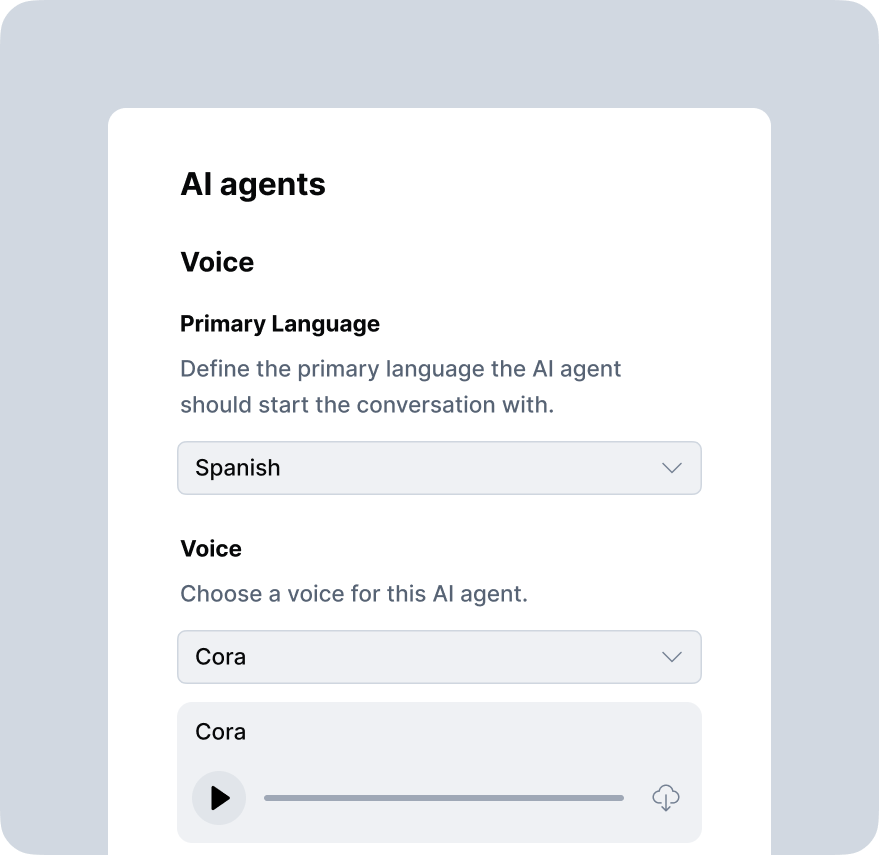
Industry-Specific Applications of AI Business Phone Systems
Just like traditional phone systems, AI phone systems can be widely adopted across industries, offering greater intelligence, automation, and flexibility. Let’s explore how different sectors can leverage AI phone systems to enhance communication:
Restaurants & Hospitality
With an AI phone answering system for restaurants, businesses can manage reservations, answer menu-related questions, and even take phone orders through an AI phone system that also functions as an AI phone ordering solution. Hotels and resorts can use AI to handle inquiries about room availability, amenities, or check-in times, ensuring guests get quick, accurate answers without waiting on hold.
Construction & Field Service Companies
For contractors and service businesses, an AI phone system can schedule jobs, confirm service appointments, and provide project status updates. It can also manage after-hours calls, routing urgent issues to on-call technicians and logging others for the next workday.
Healthcare
In healthcare settings, AI phone systems function as an AI-powered triage tool for medical calls, managing appointment scheduling, reminders, and prescription refill requests while securely verifying patient details. They can also deliver automated responses to frequently asked questions, such as office hours, insurance coverage, or directions, improving accessibility and reducing the administrative workload for medical staff.
Retail & eCommerce
Retail and eCommerce businesses handle a constant flow of customer inquiries, from order tracking to return requests. AI phone systems help manage this workload by answering frequently asked questions, processing returns, and even providing personalized product recommendations based on customer history. When a query requires human involvement, the AI seamlessly escalates the call, ensuring customers receive accurate support without overwhelming your team.
Financial Services
The financial industry is one of the busiest when it comes to customer communication. AI phone systems help banks, credit unions, and financial advisors manage high call volumes efficiently by automating balance inquiries, appointment scheduling, and transaction updates. They can also collect essential information from callers, such as account details or the reason for the call, and transfer it directly to a human agent, ensuring the conversation continues seamlessly without wasted time.
Transform Your Phone System into an AI Phone System
By now, it’s clear how many advantages AI phone systems bring to modern businesses. If you’re a startup or small business currently choosing a phone system, investing in an AI-enabled solution is a smart move. It offers far more capabilities than traditional systems while remaining cost-effective and scalable.
But what if your business already has a phone system in place and you want to unlock the benefits of AI without replacing your existing setup? Good news: providers like DialLink make this possible.
With DialLink’s AiVA, you can add advanced AI capabilities to your existing phone infrastructure. AiVA allows you to deploy AI voice agents that can handle inbound and outbound calls, route conversations intelligently, and perform warm transfers to human agents. These agents can be trained using your internal knowledge base and connected to your business tools, such as CRMs, scheduling systems, or helpdesk systems, to provide accurate, contextual responses and perform basic actions.
AI_VOICE_AGENTS
Best of all, DialLink AiVA is compatible with most cloud phone systems, landlines, and even mobile phones, making it simple to integrate and quick to set up without disrupting your current operations. For example, you can easily add AI to your healthcare phone system to automate appointment scheduling, reminders, and patient inquiries.
Conclusion
When you first hear the term “AI phone system,” you might imagine a fancy voicemail or an AI that simply takes notes during calls. In reality, it’s far more powerful. An AI phone system is a cloud-based communication platform with built-in AI capabilities like AI voice agents fully integrated with virtual phone numbers. These agents can answer calls 24/7, understand customer requests, and complete tasks such as booking appointments or responding to FAQs, all powered by artificial intelligence.
DialLink’s AI phone system stands out because it’s built specifically for startups and small businesses. It’s a lightweight, easy-to-deploy solution that doesn’t require complex enterprise configurations, allowing you to start seeing real results from day one.
Want to see how an AI phone system works in action? Start your free trial with DialLink and experience it for yourself.
Yes. Most AI phone systems, including DialLink, are designed to integrate seamlessly with your existing setup, whether that means connecting to your current business tools like CRMs or keeping your existing phone numbers through number porting.
If you’re looking to add AI capabilities to your current phone system, DialLink AiVA is the perfect solution. It’s an AI voice agent solution for business phone systems and is compatible with most cloud-based systems, landlines, and even mobile phones, allowing you to enhance your communication without replacing your existing infrastructure.
AI phone systems are built for businesses of all sizes, but they’re especially valuable for startups and small to medium-sized businesses looking to automate routine calls and improve responsiveness without hiring additional staff. From restaurants and healthcare providers to law firms, service companies, and online retailers, any business that handles frequent phone interactions can benefit.
An AI phone system can automate a wide range of call-related tasks, such as:
- Answering FAQs and routing calls to the right department
- Scheduling and confirming appointments
- Collecting customer details before warm-transferring to a human agent
- Checking order status or availability
- Logging call summaries and syncing data with your CRM
Unlike traditional answering machines or IVR systems that rely on pre-recorded messages and rigid menu options (“Press 1 for Sales…”), AI phone systems can hold natural, human-like conversations with callers. Instead of pressing buttons or following strict prompts, callers can simply speak normally, and the AI understands their intent, responds intelligently, and provides the right assistance instantly.
Featured Tags
Share

Arina Khoziainova
Content Writer at DialLink
Arina is a content writer with over 7 years of experience in the IT industry. At DialLink, she creates clear, insightful content that helps small business and startup owners simplify communication and drive growth using modern tools. With a strong focus on practical value, Arina transforms complex topics into accessible, actionable stories.
Keep Reading

What Is Interactive Voice Response (IVR)?
Learn what IVR systems are, how they work, and best practices for creating a customer-friendly IVR menu.

What Is a Virtual Call Center and How to Start One for Small Businesses?
Discover what virtual call centers are, their key benefits and challenges, and get guidance on how small businesses can launch one successfully.

Auto Attendant Recordings: Examples, Samples and Best Practices for Small Businesses
Explore auto attendant recording examples, samples, and tips for small businesses and startups to create professional phone greetings.

What is Cloud Contact Center? Benefits, Features, and How It Works
A cloud-based call center offers small businesses a flexible and cost-effective alternative to traditional setups. Let’s explore what it is and how it operates.

Google Voice Auto Attendant: What It Is and How It Works
Explore how Google Voice auto attendant works and whether it’s right for your small business.

Virtual Local Phone Numbers: Overview and Benefits
Explore everything you need to know about virtual local phone numbers to help you choose the right one for your business.

Local Vanity Phone Numbers for Business: What They Are and How to Get One
Read about what a vanity local phone number is, how businesses use them, and how to get one for your company.

The Ultimate Guide to Local Phone Numbers for Business
Explore what local phone numbers are and how your business can easily get one.